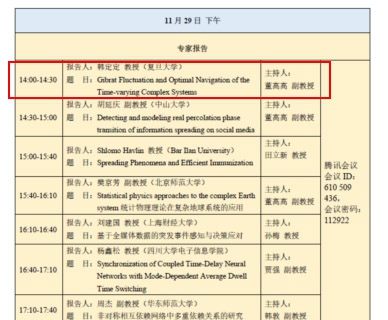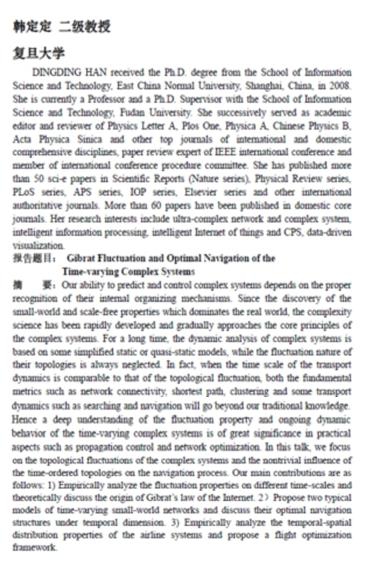On November 29, 2020, the 2020 Academic Seminar on "New Advances in Network Science" was jointly organized by the Energy Development and Environmental Protection Strategic Research Center of Jiangsu University and the Energy Interdependence Behavior and Strategy Research Center of Nanjing Normal University. Professor Dingding Han was invited to deliver a keynote speech at the seminar. Due to the pandemic and other factors, the seminar was held online via Tencent Meetings. In addition to the Hypercomplex Network Science and Intelligent Systems Laboratory at Fudan University, the seminar was attended by institutions from both domestic and international universities, including Sun Yat-sen University, Bar Ilan University, Beijing Normal University, Shanghai University of Finance and Economics, Sichuan University, and East China Normal University.
Professor Dingding Han delivered an academic report titled "Gibrat Fluctuation and Optimal Navigation of the Time-varying Complex Systems." The report focused on the fact that our ability to predict and control complex systems is rooted in our understanding of their internal organizational principles. Following the discovery of organizational laws in real networks, such as small-world features and scale-free self-organization, complexity science has made significant progress and has come closer to the core principles of complex system operation. However, dynamic analysis of complex systems has long been based on simplified static or quasi-static models, overlooking the fluctuating nature of real-world complex systems. In fact, when the timescale of topological fluctuations is comparable to the timescale of propagation dynamics on the network, the time-varying effects of the network cannot be ignored. At this point, basic statistical parameters such as connectivity, shortest path, and clustering effects, as well as basic dynamic issues like network search and navigation, will differ from previous models. Therefore, understanding the fluctuation characteristics and dynamic behaviors of time-varying complex systems is crucial and has significant application value in areas such as propagation control and network optimization. This report primarily focuses on the topological evolutionary fluctuations of complex systems and the impact of temporal topology on the network navigation process.


